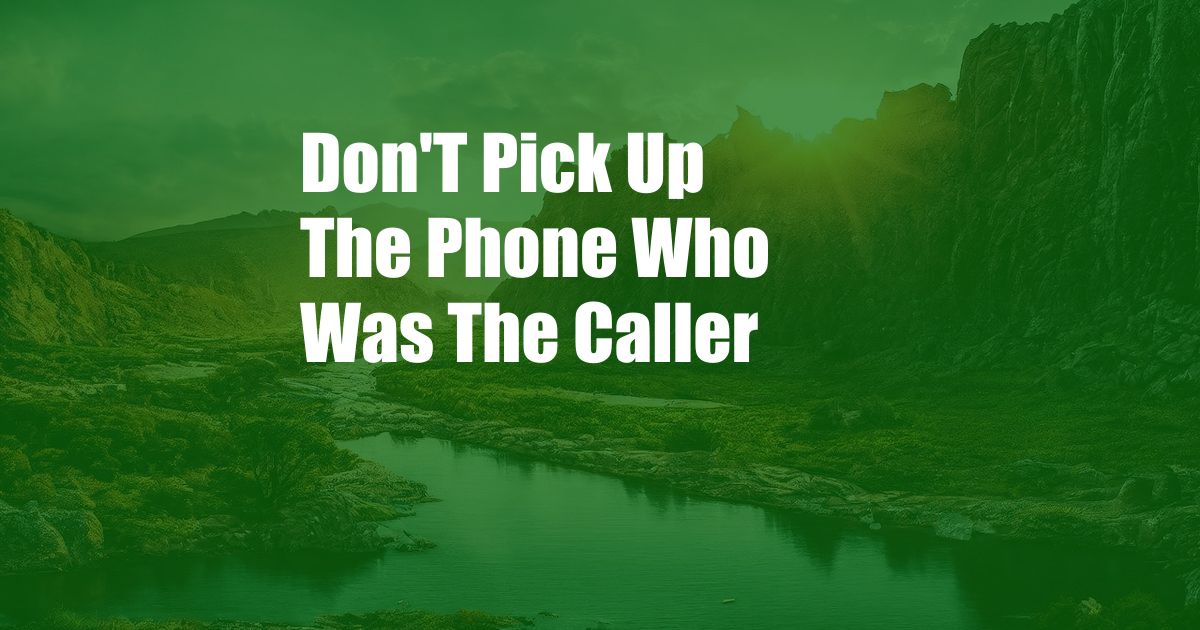
Don’t Pick Up the Phone: Who Was the Caller?
In this digital age, we often rely on our smartphones as our primary means of communication. While this convenience has its advantages, it can also lead to unwanted calls, especially from unknown numbers. If you’ve ever received a call from an unfamiliar number and hesitated to answer, you’re not alone.
This uncertainty can be particularly troubling if the caller doesn’t leave a voicemail. You may be left wondering who it was, what they wanted, and if you should call back. To address these concerns and empower you to make informed decisions, we’ve compiled a comprehensive guide to help you navigate the mystery of unanswered calls.
Unveiling the Unknown: Deciphering Anonymous Callers
There are several reasons why a caller might withhold their identity. Some calls may be legitimate, such as marketing or research surveys. However, it’s essential to be cautious, as scammers and telemarketers often use this tactic to avoid detection.
If you receive a call from an unknown number, your first instinct may be to ignore it. However, this is not always the best course of action. Some important calls, such as those from healthcare providers or family members in an emergency, may come from unfamiliar numbers. Therefore, it’s important to weigh the potential risks and benefits before deciding whether or not to answer.
Decoding the Clues: Identifying Unwanted Calls
There are several clues that can help you identify unwanted calls. One red flag is if the caller uses high-pressure sales tactics or requests personal information, such as your Social Security number or bank account details.
Another indicator of a spam call is if the caller’s number appears on a list of known robocallers. You can check online databases or consult with your phone carrier to determine if a number has been reported as spam. Additionally, be wary of calls from numbers that start with prefixes commonly used by scammers, such as 930 or 256.
Empowering Yourself: Tips for Handling Unwanted Calls
Dealing with unwanted calls can be frustrating, but there are steps you can take to protect yourself.
- Screen your calls: Set up your phone to block calls from unknown numbers or use a call screening app that can identify and block potential spam calls.
- Don’t engage with robocallers: If you answer a call and hear a recorded message, hang up immediately. Engaging with robocallers only encourages them to continue calling.
- Report spam calls: If you receive a spam call, report it to the Federal Trade Commission (FTC) or your phone carrier. This helps authorities track down and prosecute scammers.
Navigating the Legal Landscape: Your Rights and Protections
Understanding your legal rights and protections concerning unwanted calls is crucial. In the United States, the Telephone Consumer Protection Act (TCPA) protects consumers from unwanted robocalls and telemarketing calls.
Under the TCPA, businesses are required to obtain your consent before calling you for marketing purposes. They must also use a caller ID system that accurately displays their name and number.
Conclusion: Empowering You to Take Control
Unanswered calls from unknown numbers can be puzzling and potentially irritating. By understanding the reasons behind these calls, identifying unwanted calls, and taking steps to protect yourself, you can regain control over your phone.
Call to Action: If you’re tired of being bothered by unwanted calls, implement these tips. Empower yourself with knowledge and resources, and take the necessary measures to safeguard your privacy and peace of mind.
Are you interested in learning more about how to handle unwanted calls? Share your questions and insights in the comments section below!
Frequently Asked Questions
Q: What should I do if I receive a call from an unknown number?
A: Assess the situation and consider the clues mentioned above. If the caller uses high-pressure sales tactics or requests personal information, hang up immediately.
Q: How can I block unwanted calls?
A: Enable call screening on your phone or use a call screening app to automatically block calls from unknown numbers or known robocallers.
Q: What is the Telephone Consumer Protection Act (TCPA)?
A: The TCPA is a federal law that protects consumers from unwanted robocalls and telemarketing calls. It requires businesses to obtain consent before calling for marketing purposes and to use a caller ID system that accurately displays their name and number.